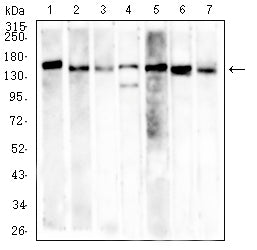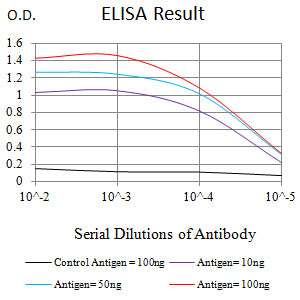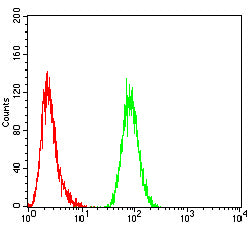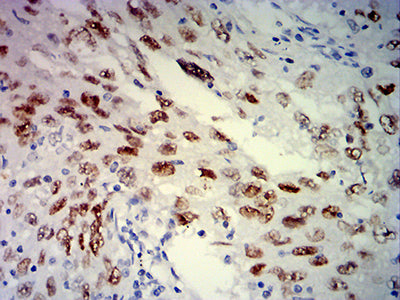



| WB | 1/500 - 1/2000 | Human,Mouse,Rat |
| IF | 咨询技术 | Human,Mouse,Rat |
| IHC | 1/200-1/1000 | Human,Mouse,Rat |
| ICC | 技术咨询 | Human,Mouse,Rat |
| FCM | 1/200-1/400 | Human,Mouse,Rat |
| Elisa | 1/10000 | Human,Mouse,Rat |
| Aliases | GTBP; HSAP; p160; GTMBP; HNPCC5 |
| Entrez GeneID | 2956 |
| clone | 2E3A10 |
| WB Predicted band size | 152.8kDa |
| Host/Isotype | Mouse IgG2b |
| Antibody Type | Primary antibody |
| Storage | Store at 4°C short term. Aliquot and store at -20°C long term. Avoid freeze/thaw cycles. |
| Species Reactivity | Human |
| Immunogen | Purified recombinant fragment of human MSH6 (AA: 374-540) expressed in E. Coli. |
| Formulation | Purified antibody in PBS with 0.05% sodium azide |
+ +
以下是关于MSH6抗体的3篇参考文献及摘要概括:
1. **文献名称**:*"Evaluation of MSH6 Immunohistochemistry as a Screening Tool in Patients With Suspected Lynch Syndrome"*
**作者**:Pals G. et al.
**摘要**:该研究评估了MSH6抗体在免疫组化(IHC)中的敏感性和特异性,用于筛查林奇综合征患者。结果显示,MSH6表达缺失与基因突变高度相关,但需结合其他错配修复蛋白(如MSH2)检测以提高准确性。
2. **文献名称**:*"Comparison of Monoclonal Antibodies for Immunohistochemical Detection of MSH6 in Colorectal Carcinomas"*
**作者**:Shia J. et al.
**摘要**:研究比较了不同克隆号(如44和EPR3945)的MSH6抗体在结直肠癌组织中的染色效果,发现克隆44在检测MSH6蛋白缺失时表现更稳定,对诊断错配修复缺陷肿瘤具有重要价值。
3. **文献名称**:*"The Role of MSH6 in the Maintenance of Genomic Stability"*
**作者**:Edelmann W. et al.
**摘要**:该文献综述了MSH6在DNA错配修复机制中的作用,并通过实验证明MSH6抗体可用于检测由基因突变或表观遗传沉默导致的蛋白表达异常,进而评估肿瘤的微卫星不稳定性(MSI)状态。
4. **文献名称**:*"Challenges in MSH6 Immunohistochemical Interpretation in Endometrial Carcinoma"*
**作者**:Leenen C.H.M. et al.
**摘要**:研究探讨了子宫内膜癌中MSH6抗体IHC检测的局限性,指出肿瘤异质性和弱染色可能导致假阴性结果,建议结合分子检测(如PCR)以提升林奇综合征筛查的可靠性。
这些文献涵盖了MSH6抗体在临床诊断、技术优化及分子机制中的应用与挑战。
The MSH6 antibody is a crucial tool in molecular pathology and cancer research, primarily used to assess the expression of the MSH6 protein, a component of the DNA mismatch repair (MMR) system. MSH6 partners with MSH2 to form the MutSα complex, which recognizes and initiates correction of base-pair mismatches during DNA replication. Defects in MSH6. caused by germline or somatic mutations, disrupt MMR function, leading to microsatellite instability (MSI) and an elevated risk of cancers, particularly colorectal, endometrial, and other Lynch syndrome-associated malignancies.
In clinical diagnostics, MSH6 antibodies are employed in immunohistochemistry (IHC) to evaluate protein expression in tumor tissues. Loss of MSH6 staining, often alongside other MMR proteins (MLH1. MSH2. PMS2), helps identify MMR deficiency, guiding Lynch syndrome screening and prognostic stratification. MSH6-deficient tumors may exhibit distinct clinical behaviors, influencing treatment decisions, such as immunotherapy responsiveness.
Research applications include studying MMR mechanisms, genetic instability, and tumorigenesis. Unlike other MMR proteins, MSH6 mutations may result in partial or delayed protein loss, necessitating careful interpretation alongside molecular tests (e.g., MSI PCR, next-generation sequencing). Its role in hereditary cancer syndromes and sporadic cancers underscores its importance in precision oncology and familial risk assessment.
×